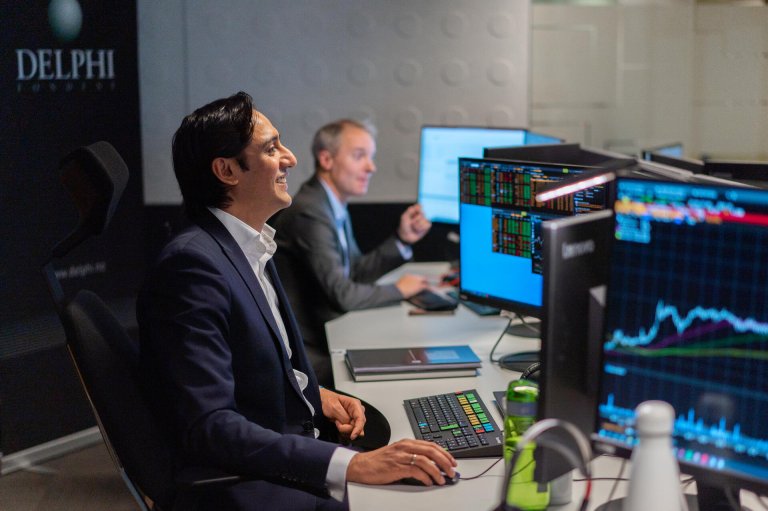You work as a portfolio manager at Delphi Funds. Tell us about your role.
- I feel like I have the most exciting job in the world. As a portfolio manager, no days are the same, and you learn something new every day. My main responsibility is deciding which stocks we should own in the Delphi Nordic fund. That's why I often say that being a portfolio manager is not a job, but a lifestyle. You're essentially at work 24/7.
What does a typical workday look like for you?
- The workday starts already in bed in the morning, where I check market developments in Asia and read some news before jumping into the shower. I usually spend a lot of time meeting companies and analysts. I am so lucky, getting to meet so many smart people from whom I can absorb knowledge! It's incredibly educational to sit in a meeting with a CEO of a large corporation with several thousand employees. I'm also frequently at conferences or on trips visiting companies and their facilities. So, fundamentally, portfolio management is about acquiring knowledge and staying updated on market changes, which means that you have to do a lot of field work.
When I'm not out of office, I spend a lot of time in front of my screen analysing and using various tools that help me make the best possible decisions. Stock prices change all the time, and that is one of many aspects you have to follow as a portfolio manager. There is no “handbook” for how a portfolio manager should work, but I believe in hard work, a bit of luck, and always being "on," since you're practically competing against the rest of the market.
How long have you been a portfolio manager, and how did your interest in asset management arise?
- I have been a portfolio manager for almost 10 years, and before that, I was an analyst for five years. I'm starting to become an old man! My goodness, how time flies. It feels like just yesterday that I started as a junior. My interest in economics actually comes from childhood. I am a second-generation immigrant, and from the start, it was very clear at home that the focus in life was to work hard and become something significant. My parents wanted me to become a doctor, but I love numbers.
I remember spending summer holidays in London where I have two older relatives. My uncle owned some kiosks, and I loved standing at the cash register and taking money even as a 7-8-year-old. It was fun! Later, I realised I was good with numbers and began studying economics in college while deepening my interest in stocks. I was fortunate to secure a job in the banking sector during my studies, which quickly revealed my passion for portfolio management.
How do you work as a team at Delphi Funds?
Today, we are five portfolio managers and one marketing manager working at Delphi. We have several funds, but in Sweden, we offer Delphi Global and Delphi Nordic. Even though each portfolio manager is responsible for their mandate, we spend a lot of time discussing and challenging each other.
We hold many meetings where each portfolio manager presents their portfolios, and the other managers' task is to ask the tough questions. It's crucial to find a dynamic in the group so that everyone is comfortable challenging each other. Sometimes it feels like being in a boxing ring, throwing punches and receiving punches back. But that's how it should be; you must be able to challenge each other, and if you have an opinion that meets no resistance, you're probably wrong.
Furthermore, you can often see that there are similarities between sectors or companies across different geographies, so it's important to utilise the expertise that others in the team have. For example, my colleague who follows the US market might see something in the tech sector that I haven't noticed.

Have you also created processes and methods within management that you can use together?
- Yes, we work a lot in teams to develop the investment process and establish routines that make us better managers. For example, we now have a self-developed tool that we use to screen the market and find the stocks with the best momentum. We have also developed a system where each manager logs their investment decisions. This allows us to easily go back in time and see what we were thinking when we bought or sold a company in the portfolio. Additionally, the other team members can easily see what I'm thinking.
I must also add that it is extremely important that you get along with your colleagues. I usually say that you spend more time with your colleagues than with your family during a typical work week. So, you have to create an environment where individuals thrive while achieving a dynamic where you dare to challenge each other, which is crucial for success in management.
You are known for your Delphi method. Can you explain the characteristics of your management approach?
- The Delphi method is the name of the investment process we use when selecting which stocks to own in our portfolios. The method focuses primarily on two things; momentum and trend analysis. History shows that trends in the market often last for an extended period. When I say trends, I mean a stock price that steadily rises according to a trend.
It's almost the same outside the stock market, for example, in the music industry, where a new trend that emerges tends to last for a while before a new trend takes over. In the stock market, this can be, for example, technology, where we have seen tech companies have had a fantastic trend for many years. Consequently, we look for companies with strong momentum.
Momentum is a strategy that has proven to work very well over time. We like to call momentum the queen on the chessboard! By this, we mean that the queen has the opportunity to go to places in a flexible way towards where things are happening. And that's also how momentum works, because we have the opportunity to invest in and own what is in focus at any given moment.
More concretely, we divide momentum into two parts. The first part is about looking at the stock price. Here, we usually look at the last 12 months. Which stocks have performed best, and which have been the worst in the past year? The stocks that have performed the strongest are the ones we continue to look more closely at.
The next thing we look at is the expected earnings for the company. That is, how much does the market expect the company to earn in the coming years? Here, we look for companies where the market is becoming more and more positive about the company's earnings. Stock prices and company earnings are closely linked over time, and it is the companies that manage to grow their revenues that become winners over time.
What do you look at in the companies you are considering investing in?
- The next step is to do deep dives, or what we call fundamental analyses of the company. Here, we look at everything from the competitive situation to meeting the company's management and visiting factories, understanding the products, meeting employees, and so on.
Sustainability is a very important part of the analysis we do, and when we meet the companies, we also get the opportunity to challenge the companies' boards on what they are doing in this area. By being owners in the companies, we can influence them to develop in the direction we believe is most appropriate within ESG. Sustainability and value development are closely linked over time.
Delphi Funds is part of Storebrand but has its own brand. Can you describe how you work together?
- Storebrand has owned Delphi for many years, and it is part of the whole palette that Storebrand offers to its clients. We have our own Storebrand funds, we have Skagen Funds, and Delphi Funds.
We collaborate with all the other managers in the Storebrand system. There is a lot of competence here that we can use. For example, we have a large team that only works with sustainability. They sit just a few meters away from me. If I am considering investing in a company, I can easily go over to them and hear how they view the company before I decide whether I want to own it or not.
We also have a large fixed income team with managers who follow the bond market and the macroeconomy in more detail than I do. Being able to use their expertise, discuss, and hold meetings with them is very valuable.
You manage the Delphi Nordic fund. What would you say are the two most exciting aspects of working with investments in the Nordic region?
- The first thing that makes the Nordic region so exciting is the sum of the Nordic countries and the sectors that exist in these countries. In Norway, we are strong in oil and aquaculture and have been working with these industries for many decades. Sweden has a large industrial sector with some of the largest industrial companies in the world. Additionally, Sweden is strong in finance and real estate. Moving on to Denmark, it is primarily the health sector that stands out and is the largest. Denmark is also significant in the transport sector. Finland has been leading in the forest and paper industry.
The sum of all these sectors is a diversified investment universe with many different companies operating in various industries. We like to call the Nordics "a world in miniature." Nordic indices do not differ much from global indices. The main difference is that you get a little less technology and a bit more industry than if you invest in a global index.
And what is the second?
- The second aspect that makes the Nordics so exciting as an investment universe is when you take a closer look at the Nordic companies. It is simply impressive to see how large and successful many of these companies have become. Many of them were founded as family businesses several hundred years ago, but have grown over time to become global leaders with strong positions in their segments. I call these companies Nordic champions!
Examples of such companies include Volvo Trucks, Atlas Copco in compressors, ABB in electrification, and Novo Nordisk in health. These companies have grown by developing products and acquiring other companies in different geographic regions. By introducing a Nordic culture where responsibility is given to those closest to the markets, these companies also manage to take advantage of cost synergies, resulting in very good margins over time. This provides an excellent return on invested capital, which is the important driver for stock prices over time.
What interest do you see from investors outside the Nordics, and what strengths does the Nordic market have that attract investors from other parts of Europe?
- I am very fond of the Nordic universe, and I believe that foreign investors should consider investing in this region. Nordic companies have been leaders in sustainability for decades. I believe sustainability is part of these companies' DNA. This is not something new. The companies have always looked at how they impact society and the environment around them and what they can do to get even better, and not least how they can help influence the society they are part of to develop in an even better direction. We have come the furthest when it comes to gender equality.
Moreover, in the Nordics, we have advantages such as access to a highly educated population, stable state finances, and also stable frameworks for conducting business and development. Many of the Nordic companies are practically development companies driven forward by research and development while production is located in other regions. Stability is incredibly important when conducting business, which is why I think the Nordics might be one of the best regions to run companies from.
I notice that more and more people are becoming aware of the Nordics and this universe, and I also notice that more foreign investors want to learn more about the history behind the Nordic successes.
What challenges can there be as a portfolio manager with this strategy and market?
- Momentum is a strategy that has proven to perform very well over time. So, life as a momentum portfolio manager is actually quite comfortable if you own the companies and sectors that steadily rise over time.
The big challenge for momentum portfolio managers arises when markets are characterised by uncertainty. This happened, for example, when the tech bubble burst in the early 2000s or during the financial crisis. In recent times, we have also experienced uncertainty that has caused interest rates to suddenly start rising driven by high inflation.
During these types of periods when the market is characterised by a bit more uncertainty, momentum works a little less well. The reason for this is that there are fewer trends to use in an uncertain market. The trends are often a bit shorter and fluctuate much more before they get a clear direction. As a momentum portfolio manager, it is therefore extremely important to have patience during periods when such uncertainty arises.
What are you most looking forward to for the rest of 2024?
- The year 2024 has been full of excitement, and we expect it to remain so for the rest of the year. Momentum has delivered a strong performance in 2024 after facing some challenges in the previous years.
One of the key themes that we need to monitor closely is the inflation outlook. Many of you have noticed the interest rate hikes that have taken place in recent years. Sweden has already reversed course and cut its interest rate, but other countries are still undecided about when to follow suit. Some analysts expected this to happen before the summer, but the situation has turned out to be more complex than anticipated.
In the US, for example, the Federal Reserve has delayed its rate cuts, and the markets are paying attention to the developments in technology and artificial intelligence. These sectors have a lot of potential to disrupt the economy and create new winners and losers. So far, we still see that unemployment is low and that the interest rate decision everyone is waiting for is being postponed.





